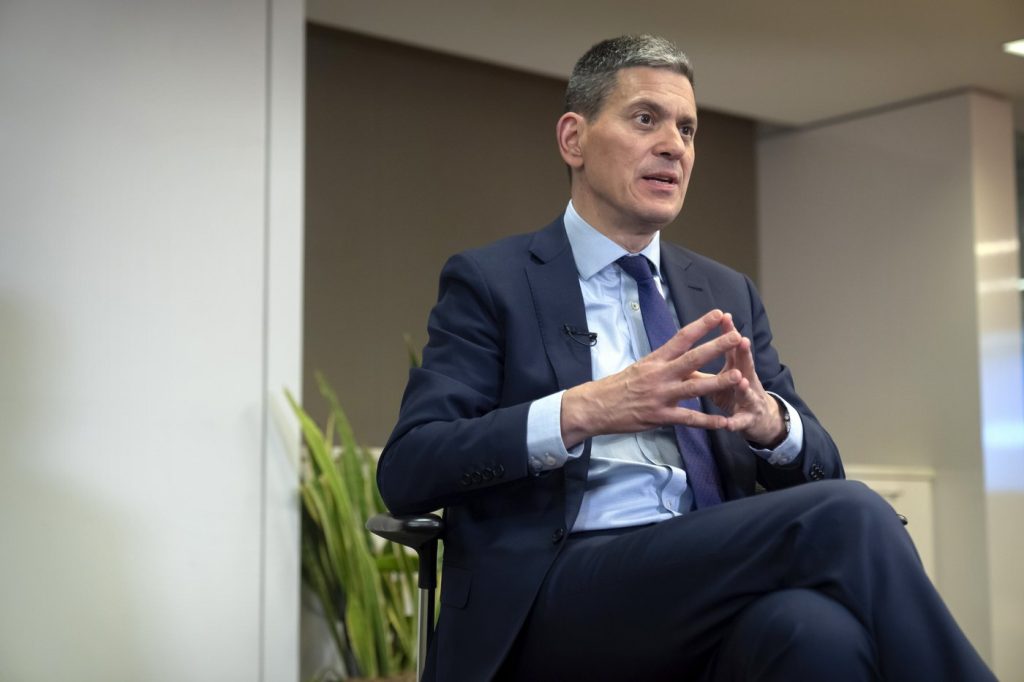As global humanitarian organizations face decreasing funding, David Miliband, president of the International Rescue Committee (IRC), emphasizes a critical dilemma: sustaining life for millions in the most vulnerable countries will necessitate reallocating assistance away from programs in more affluent nations. These programs focus on issues ranging from climate change to refugee resettlement.
In nations such as Sudan, life-saving food, water, and health programs are already collapsing, with 80% of communal kitchens shutting down, eliminating food access for millions. This decline follows the Trump administration's dissolution of the lead U.S. aid agency, leading to the termination of numerous foreign assistance programs.
"There are lives on the line," Miliband remarked in a recent interview in Washington, where he also engaged with lawmakers and officials from the Trump administration. He noted that the current aid framework, where only 14% of total aid is directed towards humanitarian efforts, must be reevaluated. Presently, middle-income countries receive more funding than low-income ones, which is a misalignment that Miliband seeks to address.
The ongoing triage reflects the consequences of the Trump administration's decision to pull the U.S. from its position as the largest global aid donor. The United States used to contribute roughly one-third of the more than $200 billion in foreign assistance given annually by governments worldwide. Recently, the White House proposed a budget with an 84% reduction in such funding.
Other significant European donors, including Britain, are also cutting aid to allocate more finances toward defense spending, amidst concerns over potential shifts in U.S. commitments to European defense. Miliband and the IRC are advocating for specific changes, suggesting that financial support from wealthy nations should be redirected toward addressing urgent needs in poorer countries grappling with the consequences of war and climate change.
"If you’re looking for a guideline, I would say at least half the global aid budget needs to go to conflict states," Miliband stated, a significant increase from the current quarter of total aid allocated to these areas.
Miliband argues that climate mitigation in wealthier nations and assistance for refugee resettlement should be deprioritized in the face of the current funding crisis. As organizations cope with the implications of the Trump administration's funding reductions, they are reassessing strategies to focus on critical and strategic aid. Kate Phillips-Barrasso, a vice president of Mercy Corps, voiced concerns that donor funds might increasingly split between financing infrastructure in middle-income countries and providing only the most basic assistance in poorer nations.
She expressed fear that this bifurcation could lead to the marginalization of vital support necessary for the poorest and most fragile countries to combat climate change and other enduring challenges. Miliband and the IRC are calling for a concentrated effort to deliver humanitarian aid and climate assistance to 13 countries facing severe challenges due to conflict and environmental degradation. Among these are Afghanistan and Yemen, which have seen significant cuts in U.S. aid under the previous administration.
The other nations identified by the IRC as urgent priorities for diminishing aid resources include Haiti, Burkina Faso, the Central African Republic, Chad, Mali, Mozambique, Somalia, South Sudan, and Sudan. The funding cuts implemented by the Trump administration have forced major aid organizations to withdraw from entire countries, jeopardizing the progress made in various African nations and posing a risk of further destabilization and extremist expansion in volatile regions such as the southern Sahara.











